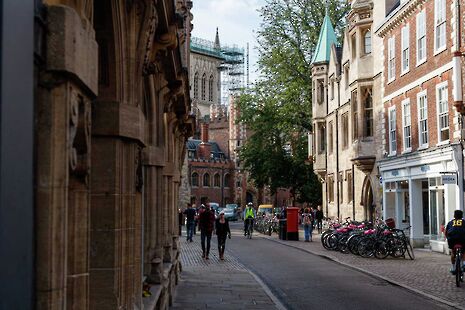Breaking out of my shell
“Keep your doors open, and you’ll find comfort even amidst the discomfort of taking that first step out of your shell,” writes Yan-Yi Lee, in her Letter to Freshers

The wine and cheese receptions during freshers’ week were a blast for many, but a true ordeal for me. There I stood anxiously, not quite sure how to blend into those circles and circles of people, whose exuberant vibes seemed to suggest rapidly-forming bonds that I, unfortunately, had already missed out on. While I was grateful to everyone who approached me, I wasn’t sure how to conduct a meaningful, engaging conversation beyond the predictable confines of “what’s your name?”, “where are you from?,” and “what do you study?”. Anything beyond that felt awkward and contrived, usually accompanied by nervous and fake smiles.
Was I ‘weird?’ Did they find common ground with me, an international student from the other side of the planet? Or worse, did I just embarrass myself by blurting out something that didn’t make sense in English? While tucking into wine and cheese alone in the far corner of the room wasn’t what I had wished for, it was what inevitably happened whenever I was too shy to assert myself.
What would you say to your fresher self?
Write for Varsity's annual series, Letters to Freshers. Just email our Features team with a 150-word pitch with a story to tell about your time at Cambridge.
It may not seem like it to those who know me, but I am an introvert, and prone to panicking whenever I have to rummage through my brain for things to say during social interactions. This is especially the case when I am with strangers, or those with backgrounds very different from mine.
My anxiety has led me to make regrettably unhealthy decisions: I went as far as taking up language lessons as an excuse to avoid attending free weekly suppers for graduate students at my college; I missed many of those fascinating weekly seminars on neurodevelopmental disorders, all because I was overwhelmed by the enthusiasm of everyone there; I carried my lunch far away from the faculty to eat alone so that I wouldn’t intrude into others’ seemingly well-established friend circles; and I would even avoid stepping into the kitchen to evade small talk with housemates, despite knowing that I really needed to place that carton of milk back in the fridge.
There was nothing to love about what had become of me. The truth is, a big part of Cambridge life involves socialising with other people, and there really isn’t any way to avoid it. It’s deeply ingrained in the core culture of this university — in the centuries-old traditions of formals, balls, student societies, and so on.
But it isn’t just about sipping wine and having fun. It’s also about building connections by exchanging thoughts and sharing perspectives, oftentimes beyond the confines of what we’re familiar with. It’s about reminding ourselves that knowledge has no boundaries, and coming together to build better selves. It then hit me hard — my anxiety was costing me great opportunities, and because of it, my time here was being rendered somewhat less meaningful.
While I may not be able to magically form amazing and enduring relationships with everyone I met, it sufficed [...] to be myself
The time came where I eventually convinced myself to break out of that shell. After Christmas, I wrestled hard with my social anxiety, and took steps forward. I tried not to assume what others thought of me (especially of me as a foreigner) and just ‘went for it.’ I started by relaxing when making small, ‘catch-up talk’ with people I bumped into around college and gladly realised that things didn’t always have to be so awkward. I showed genuine interest in how my peers were doing with their term work, and more importantly, their hobbies and the research they were doing. Instead of frittering time away checking Facebook feeds, I would spend lecture breaks to check on how others were getting on with their lives, both academically and personally. I invited them to formals, to lunch, to grab a cup of coffee.
I learned to accept that while I may not be able to magically form amazing and enduring relationships with everyone I met, it sufficed to not force anything, to be myself, and to be friendly. I attended workshops and took part in studies, where I gradually came to identify certain personality types that I seemed to bond effortlessly with. With this adjusted mentality, I found myself never faking a ‘socialise-mode smile’ anymore for the rest of the year, and to my relief, I forged friendships that nourished and sustained me.
I understand that as freshers, many of you can’t wait to start life at university, and perhaps only some of you might be able to relate to the social anxiety I experienced. Either way, do try to take it easy and just be yourself when meeting strangers for the first time. Remember that being plunged into a new environment is a nerve-wracking experience for everyone, and that there is nothing wrong with you if you don’t seem to ‘click’ with whoever is sitting across you at the dining table at formal hall, or if you just feel incredibly awkward with that coursemate who you always bump into at seminars.
Even if it seems like you stand out or don’t fit in, you’ll find yourself comfortable with someone, even if eventually they are just a small group of people. So keep your doors open, and you’ll find comfort even amidst the discomfort of taking that first step out of your shell.
 News / Judge Business School advisor resigns over Epstein and Andrew links18 February 2026
News / Judge Business School advisor resigns over Epstein and Andrew links18 February 2026 News / Gov grants £36m to Cambridge supercomputer17 February 2026
News / Gov grants £36m to Cambridge supercomputer17 February 2026 News / CUCA members attend Reform rally in London20 February 2026
News / CUCA members attend Reform rally in London20 February 2026 News / Union speakers condemn ‘hateful’ Katie Hopkins speech14 February 2026
News / Union speakers condemn ‘hateful’ Katie Hopkins speech14 February 2026 News / Hundreds of Cambridge academics demand vote on fate of vet course20 February 2026
News / Hundreds of Cambridge academics demand vote on fate of vet course20 February 2026










